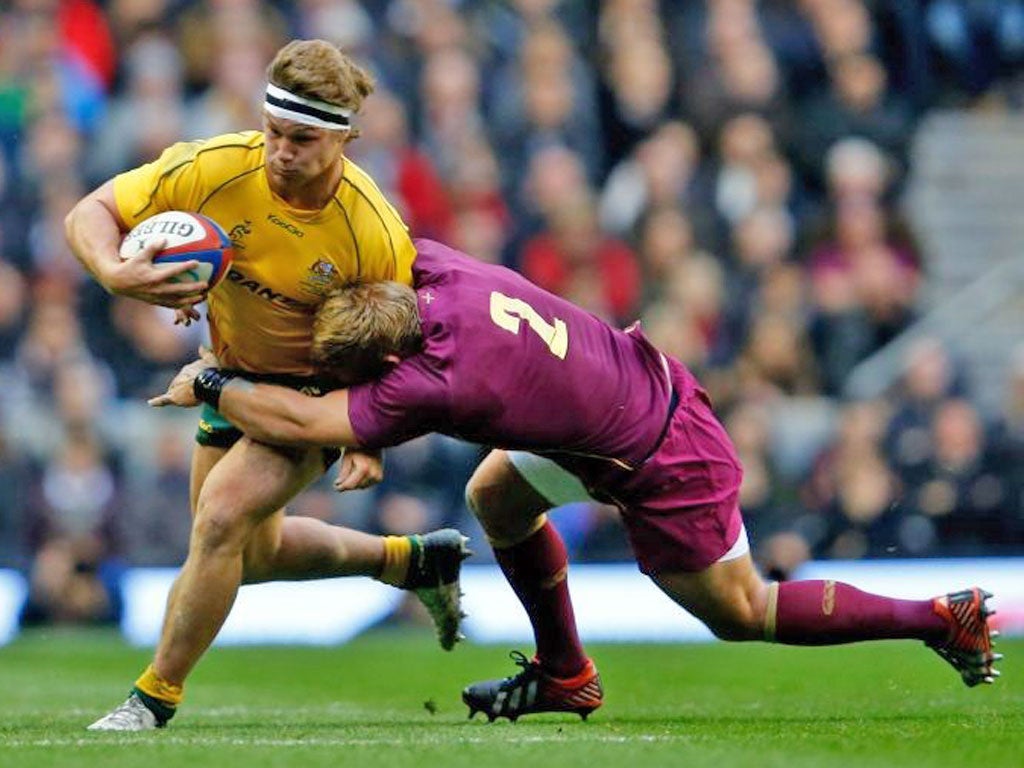James Lawton: Michael Hooper's fresh-faced brilliance mocks latest England reinvention
In English rugby yesterday’s comer is quickly transformed into today’s regret

So many questions came to the surface at Twickenham you could weep for the pressure on England's coach Stuart Lancaster as he attempts to supply a few answers before the South Africans arrive at the end of the week.
Yet the biggest inquiry of all really needs to go not to the man who less than a year ago was given the job of repairing a ruined professional culture but to the hierarchy of the Rugby Union. It asks simply this: if Australia's latest wunderkind Michael Hooper's English father, a forward of relatively modest accomplishment with Blackheath, had stayed at home, would Saturday's man of the match have looked quite so capable of stepping so easily into the fabled boots of such as George Smith and David Pocock?
At 21 years and one month, would he, like so many of his predecessors, have suggested quite so strongly that he had been playing rugby for ever?
Would he have shown so much familiarity with all the nuances of the game as he played such a vital role in lifting the Wallabies up from the floor after their thrashing by France?
The answers have to converge into a big and depressing "no".
While Lancaster and his captain Chris Robshaw talk desperately of a need for a much more clinical approach against the South Africans and the All Blacks, as the prospect of a decent seeding for the World Cup here in three years hangs so precariously, Hooper was being widely acknowledged as the latest arrival in the firmament of world rugby stars.
Against England he was playing his 11th Test match. That could just have easily read 111. There was never a moment when he didn't seem to know what to do. He played with the most conspicuous freedom in a team which was supposed to be at a point of breakdown, with its embattled coach Robbie Deans accused of "destroying" the Wallaby tradition by no less than the legendary David Campese.
If Hooper is awash with English blood, he is also suffused with a self-belief and a confidence that was so poignantly missing in the efforts of the representatives of his father's homeland. Hooper looked as if he might well have learned the game in his Sydney cradle; England still appeared to be playing by numbers.
It is, surely, the issue which now dominates the brief tenure of Lancaster as he fights to prove that, having returned England to a state of basic professional discipline that was so shockingly absent during last year's World Cup in New Zealand, he can push forward with a team seriously competitive against the Southern Hemisphere superpowers.
Statistically, he is already looking down the gun barrel. The Australians, apparently demoralised by their disintegration in Paris, seemed to represent Lancaster's best chance of a breakthrough at the highest level. Yet on Saturday night he not only went home with defeat, and a score of questions about England's lack of composure, passing fluency and workaday game nous, but a record of growing futility against the Southern theatre of war. By the end of the month it is likely to have stretched to five defeats and a draw.
Even more disturbing is the message conveyed by young Hooper. Not only does the Southern Hemisphere enjoy a much greater supply of diamonds, they are so much more readily polished. By comparison, the English pursuit of significant players remains a kind of agony. Manu Tuilagi, when he was not jumping off the ferryboat in Auckland, was supposed to represent something of a force of nature. Now he resembles more another young lion of England of questionable ferocity.
Two years ago Ben Youngs was a revelation of poise and an exciting example of all that might be positive in England's game. Now, his efforts to inject some boldness into England as a second-half substitute for the prosaic Danny Care, are widely dismissed as so much wishful thinking. In English rugby yesterday's comer is so quickly transformed into today's regret.
For Lancaster the fight is to break this relentless sense of dwindling horizons. Sooner or later – and the critical climate when the great Nathan Sharpe held up the cut-glass trophy at Twickenham, was that it will be sooner – the most pressing question will not be about England's systemic failure to produce significantly rounded international players but the identity of a rugby man who might have some chance of changing the pattern.
Many felt that notwithstanding his courageous tackling of the moral crisis that England encountered a year ago, Lancaster was some way from the likeliest candidate. In this context, the favourite was Nick Mallett of the Southern Hemisphere and, maybe, a deeper feel for the imperatives of cutting-edge international rugby. One fact is certain. No one could have re-opened the debate more forcefully than the kid with the English genes and the Australian instinct.
Join our commenting forum
Join thought-provoking conversations, follow other Independent readers and see their replies
Comments
Bookmark popover
Removed from bookmarks